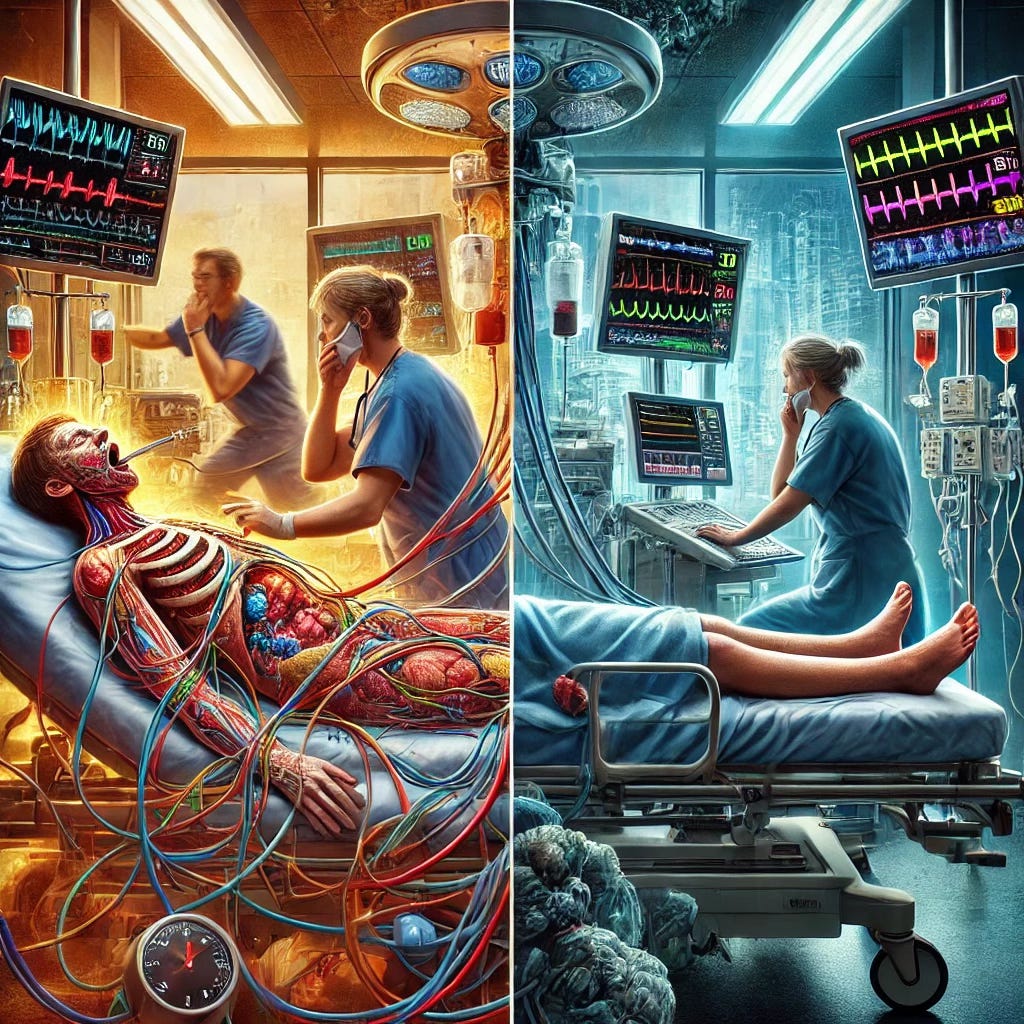In both life and medicine, we often find ourselves responding to urgent crises—those situations that scream for immediate attention. But just like the silent progress of chronic conditions, there are habits in our lives that slowly creep up, poisoning our growth and well-being, even when they don’t demand our attention right away.
As a doctor in the ICU, I’m constantly faced with the challenge of managing acute medical conditions, such as myocardial infarction (MI) and tension pneumothorax, where every second counts. But on the other hand, I see patients with chronic illnesses like chronic liver disease (CLD), chronic kidney disease (CKD), and chronic obstructive pulmonary disease (COPD), whose symptoms may not be as pressing—but the damage is just as deadly, creeping up over years.
In today’s blog, I want to explore this *acute vs. chronic conundrum* and draw a parallel between the medical world and our personal lives. How often do we focus on life’s acute emergencies while ignoring the chronic habits that slowly poison us? And what can we do to reverse these patterns before they lead to a personal crisis?
Urgency vs. the Slow Poison: The ICU Perspective
In the ICU, acute conditions don’t give you time to think—they demand immediate action. Cases like heart attacks, pulmonary embolisms, and tension pneumothorax flash upon you, and as a doctor, your training takes over. You’re forced to rely on every bit of medical knowledge and experience to help the patient survive the event.
But chronic conditions? They’re a different story. Chronic liver disease, chronic kidney disease, and COPD don’t press you for urgent action—at least, not right away. I’ve seen patients with chronic bronchitis talking normally, even with a PCO2 level of 100-120. Meanwhile, I’ve seen patients with acute airway issues deteriorate rapidly at a PCO2 of 50-60.
The human body is beautifully designed to adapt, allowing people to function even when toxic substances like ammonia and uremia are silently building up. But adaptation doesn’t mean everything is fine. Beneath the surface, these toxins are damaging the body, affecting cognitive function, memory, and emotional regulation. It’s only a matter of time before the chronic condition leads to a sudden deterioration or exacerbation.
Life’s Silent Crisis: The Chronic Habits That Slowly Poison Us
Just as chronic conditions erode health over time, our daily habits can slowly poison our lives, often without us realizing it. In life, we’re constantly dealing with the acute—the urgent work deadlines, the unexpected crises, the personal conflicts that demand our attention right now. But what about the chronic habits we’re conditioned to develop and ignore?
Habits like incessantly scrolling through social media, procrastinating until the last minute, stress-eating, or overthinking—these don’t feel like emergencies. They don’t force you to stop and take action. Instead, they subtly condition you to become someone you’re not.
You adapt. You function. But your cognitive skills start to slip, your emotions spiral out of control, and slowly, without realizing it, you inch closer to a personal breakdown. It’s no different from the patient with chronic bronchitis, whose PCO2 level is skyrocketing but appears stable—until one day, their body can no longer cope.
My Personal Struggle: The Silent Creep of Chronic Habits
I’ve been there. I’ve experienced the slow creep of chronic habits that were poisoning me without even knowing it. There was a time when procrastination ruled my life—I waited for the adrenaline to kick in before tackling important tasks. I’d skip my workouts because there was always something ‘more urgent’ to do. I let overthinking and self-doubt cloud my decisions.
And for a long time, I functioned. I convinced myself that I was ‘managing.’ But the truth was, I wasn’t thriving. I was stuck in mediocrity, slowly conditioned by these chronic habits to be less than my best self. My emotions weren’t in my control. My cognitive sharpness was fading. I was slowly heading toward a crisis point.
The worst part? When I tried to change these habits, I hit withdrawal. Breaking free from these ingrained behaviors felt impossible. But that’s when I realized—the solution wasn’t in drastic changes. It was in building small, positive habits that could slowly reverse the damage.
Building Micro-Habits: Reversing the Damage Before It’s Too Late
When I started to introspect, I found that the only way to truly break free from toxic chronic habits was by introducing small, manageable changes—micro-habits that wouldn’t overwhelm me but would gradually shift the course of my life.
Here’s the thing: making drastic changes is like shocking the system. It’s like trying to cure a chronic condition overnight—it’s not sustainable. You end up in withdrawal, feeling stuck in a bigger hole than before. But with micro-habits, you start small. You start with things like committing to just 5 minutes of exercise each day or cutting down your social media use by a few minutes. The changes are small, but they compound over time.
What’s magical about micro-habits is that they create momentum. As you begin to see small wins, your confidence builds. You start to realize that change is possible, and over time, these small habits ripple out and replace the toxic ones. Slowly, you begin to see real progress.
Time for Introspection: What Chronic Habits Are Poisoning You?
So, here’s the real question: What are the chronic habits in your life that are quietly poisoning your potential? What small actions or thought patterns are pulling your physical, mental, or emotional energy down?
It’s easy to ignore them. After all, they don’t press you to take action right now. But just like a chronic disease, they’re doing damage beneath the surface. And if you continue to ignore them, one day they’ll erupt into a personal crisis.
I encourage you to take a moment today to reflect. What small, positive habits can you start building today that will begin to reverse the damage? Remember, it’s not about making drastic changes overnight. It’s about building micro-habits that create real, sustainable growth.
Conclusion: The Power of Small Wins and Micro-Habits
In both life and medicine, it’s easy to focus on the acute emergencies and ignore the chronic problems that slowly build up. But in doing so, we allow those chronic habits to poison us until we reach a tipping point.
The key to reversing this isn’t in drastic measures—it’s in starting small. Build micro-habits. Celebrate the small wins. Over time, those small actions will create a ripple effect that transforms your life.
As always, stay balanced, stay healthy, and remember—true growth starts with those habits we’ve been ignoring.
Dr.Krishna Bharath,MD



















Share this post